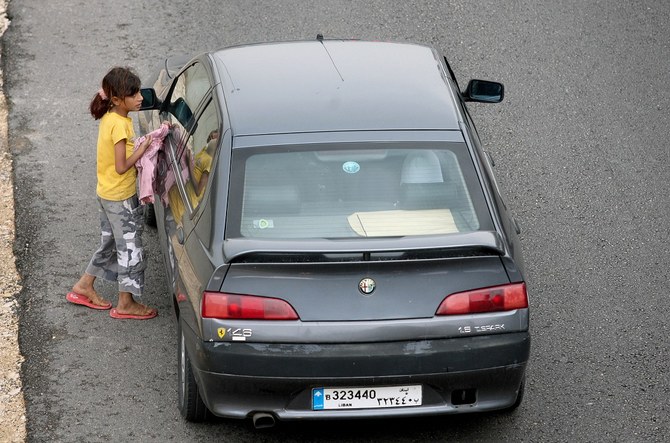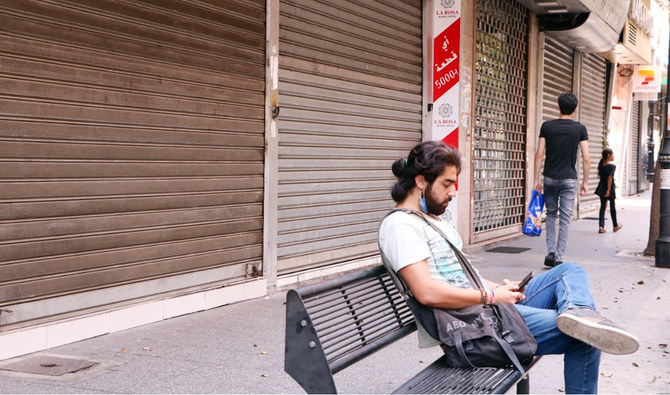
By BARIA ALAMUDDIN -- arabnews.com -- For two millennia the Silk Road was a 6,500km caravan route connecting China to the West, for the export of spices, fabrics and tea. Beijing today is investing hundreds of billions of dollars reopening these routes as an immense arena of Chinese commercial hegemony, with massive investments straddling Central Asia and Pakistan, and a $400 billion deal with Iran. Chinese hawks view Lebanon’s crushing financial crisis as a bargain opportunity to consolidate its presence in the eastern Mediterranean.
The incompetence of Lebanon’s bankrupt political class has plunged IMF bailout talks into deadlock. Politicians refuse to acknowledge the immensity of their financial black hole (the product of four decades of systematic looting), let alone countenance the extensive measures needed to staunch Lebanon’s economic bleeding. The Hezbollah-backed government is falling back on scattershot blame and conspiracy theories, with the ineffectual and widely despised Prime Minister Hassan Diab declaring: “We know well that there is a big decision to besiege the country. They are preventing any assistance to Lebanon.” Shunning the IMF, Diab is turning instead to China. Ambassador Wang Kejian was invited to high-level ministerial talks to “activate cooperation between the two countries.” The biggest cheerleader for salvation from the East is Hezbollah’s Hassan Nasrallah, who proclaimed: “Chinese companies are ready to bring in money, and without any of the complications that we talk about in Lebanon. We don’t have to give them money, they will bring money into the country.” Hezbollah-friendly media outlets have been evangelizing Chinese proposals for $12 billion investments in ports, railways, electricity and waste management.

By Samia Badih -- thenational.ae -- Many experts have described it as the worst economic crisis in Lebanon's history. The Lebanese pound's value has dropped to record lows against the dollar, food prices have gone up and unemployment has risen drastically as more businesses shut their doors. Coupled with a global pandemic, it has become a hopeless situation for many, including artists in the film and television industry. A "sinking Titanic" is how director Tony Eli Kanaan, 27, describes it. "I am super frustrated; I'm super numbed. I hate that we have adapted to this situation," Kanaan tells The National. "We have just adapted to this joke and that is what is frustrating me, other than the denial and the numbness I feel," he adds. Also a writer and actor, Kanaan's career had only recently started to take off, and his ultimate goal is to go to Los Angeles to pursue acting professionally. "I'm trying to get out of here," he says. "I still think whoever has the chance to leave should leave."
His message might surprise some, considering the success the young filmmaker has started to garner in his home country. Thanks to the comedy skits he posts on his Instagram page, Kanaan has racked up more than 50,000 followers in fewer than five months. However, despite his growing social media following, Kanaan says it is hard to not have a pessimistic view. "My perception of Lebanon is complete doom. How sustainable is this life?" And these feelings of despair are not just felt by the younger generation. The same sentiment is echoed by creatives who have been in the production industry for years. 'Who is going to invest in films?'
by naharnet.com — The Israeli army on Saturday sent a spy balloon over the Lebanese border town of Houla, Lebanon’s National News …

by Carine Hajjar ,National Review -- news.yahoo.com -- This week, while reading a slew of WhatsApp messages from family in Lebanon, I was shocked to hear that my cousin Dalila had to pay the equivalent of USD 200 for dairy products for her family. Expensive dairy is the least of Dalila’s worries, however. As a new mother, she is facing quotas when buying products for her baby boy. “Last month was hard because I was only able to buy two of each item — a maximum of two diapers!” she told me. Her biggest problem is getting formula: “All baby formula is out of stock. They are not going to bring them to Lebanon anymore.” This is the new normal for Dalila and all mothers during Lebanon’s second month of hyperinflation. But for me, this is a shocking departure from the Lebanon I remember. It was just two years ago that I spent a few weeks in Beirut with my family, celebrating Dalila’s wedding. We spent those summer nights going to many of Beirut’s fabled restaurants and enjoying the vibrant shopping centers, the streets filled with sleek sports cars, and the extravagant hotels that the Mediterranean nation is known for. During the day, we’d venture to different beaches, amazed at the lavish coastal resorts. On family visits to surrounding villages, we were greeted with trademark Lebanese hospitality. From the moment you step into a house, there is a full mezza set out with hummus, tabbouleh, grape leaves, nuts, and much more. Just when you’re about to burst, platters of kebabs, rice, and vegetables are brought out, topped off by towers of fruit for dessert. And, of course, an ornate hookah was at the disposal of any visitor as they ate and drank.
In a word, it was a place of abundance. But the “land of milk and honey,” where locals boast of their ability to “ski and swim in one day,” is now financially gutted, leaving its citizens wanting for electricity and even meat. The rumblings began in October, when a proposed WhatsApp tax sparked massive protests against the Lebanese government and its decades of corruption. Since then, the Lebanese economy has crumbled and the nation has defaulted on its Eurobond loans, government services (which were always unreliable) have virtually disappeared, and Lebanon has become the 62nd case in history of hyperinflation, with a rate of 462 percent. Lebanon and Venezuela are the only two countries in the world currently experiencing hyperinflation. Many chalk up the nation’s crisis to years of a government-led Ponzi scheme. In a New York Times op-ed, Lina Mounzer, a Lebanese citizen, points to years of unsustainable interest rates and debt financing by Lebanese banks in conjunction with the central bank, the Banque du Liban, and the government. Mounzer notes that politicians achieved “individual enrichment” using “increased public debt.” More specifically, Lebanese banks offered exorbitantly high interest rates to attract foreign currency — mainly U.S. dollars — to maintain the peg for the Lebanese pound (LBP).
Khazen History


Historical Feature:
Churches and Monasteries of the Khazen family

St. Anthony of Padua Church in Ballouneh
Mar Abda Church in Bakaatit Kanaan
Saint Michael Church in Bkaatouta
Saint Therese Church in Qolayaat
Saint Simeon Stylites (مار سمعان العامودي) Church In Ajaltoun
Virgin Mary Church (سيدة المعونات) in Sheilé
Assumption of Mary Church in Ballouneh
1 - The sword of the Maronite Prince
2 - LES KHAZEN CONSULS DE FRANCE
3 - LES MARONITES & LES KHAZEN
4 - LES MAAN & LES KHAZEN
5 - ORIGINE DE LA FAMILLE
Population Movements to Keserwan - The Khazens and The Maans
ما جاء عن الثورة في المقاطعة الكسروانية
ثورة أهالي كسروان على المشايخ الخوازنة وأسبابها
Origins of the "Prince of Maronite" Title
Growing diversity: the Khazin sheiks and the clergy in the first decades of the 18th century
Historical Members:
Barbar Beik El Khazen [English]
Patriach Toubia Kaiss El Khazen(Biography & Life Part1 Part2) (Arabic)
Patriach Youssef Dargham El Khazen (Cont'd)
Cheikh Bishara Jafal El Khazen
Patriarch Youssef Raji El Khazen
The Martyrs Cheikh Philippe & Cheikh Farid El Khazen
Cheikh Nawfal El Khazen (Consul De France)
Cheikh Hossun El Khazen (Consul De France)
Cheikh Abou-Nawfal El Khazen (Consul De France)
Cheikh Francis Abee Nader & his son Yousef
Cheikh Abou-Kanso El Khazen (Consul De France)
Cheikh Abou Nader El Khazen
Cheikh Chafic El Khazen
Cheikh Keserwan El Khazen
Cheikh Serhal El Khazen [English]
Cheikh Rafiq El Khazen [English]
Cheikh Hanna El Khazen
Cheikha Arzi El Khazen
Marie El Khazen